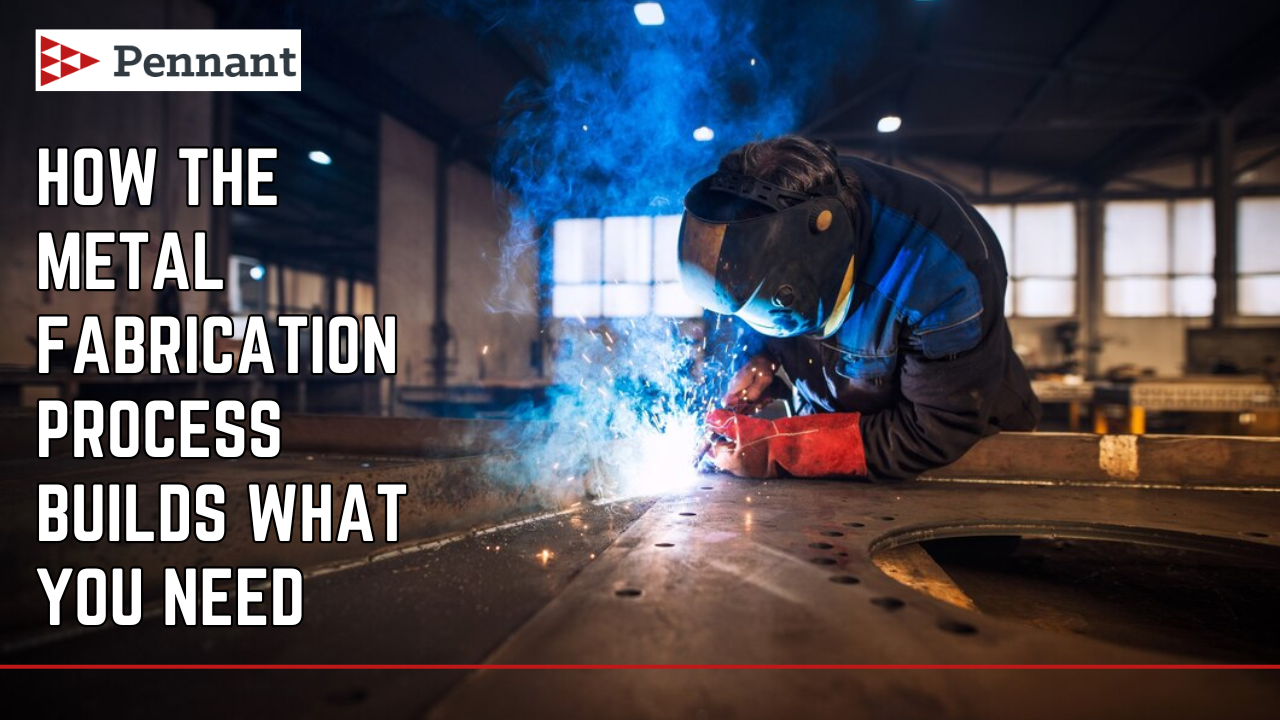How the Metal Fabrication Process Builds What You Need

Strong 8k brings an ultra-HD IPTV experience to your living room and your pocket.
Increased advancements in the manufacturing process and how metals are manipulated to produce new products for sustainability. They range from the custom aluminum brackets holding machinery together to the steel beams supporting the extensive bridges.
The metal fabrication process is the foundation of countless modern advancements in designing these structures. This method uses metal fabrication services to transform raw materials into functional, durable, and sometimes artistic structures. Suppose you are planning a residential improvement, monitoring a major construction job, or designing a new product accurately.
Understanding how these intricate processes work can help you make better-informed choices and communicate better with custom metal fabricators. This blog discusses the metal fabrication process, the tools and techniques used, and how it generates the precise metal product you require in your desired form.
Understanding Metal Fabrication: More Than Just Welding And Cutting
Metal fabrication transforms and assembles raw sheet metal or other types of metal into usable products. It is not about cutting a piece of metal and welding it together. It is an intricate multiple-step process that requires precision, planning, timely execution, and skilled craftsmanship.
The intricate journey from extensive raw materials to a finished part usually begins in a fabrication shop, a small local business, or a large-scale industrial operation.
These shops combine manual labor, specialized machinery, and computer-aided design (CAD) to create everything from small brackets to entire building frameworks.
Stages Of The Metal Fabrication Process
Let us provide the necessary steps that most metal fabrication projects proceed through:
Strategic Foundations: Design And Planning Execution
Every metal fabrication project starts with a foolproof plan. This primary stage involves clients, designers, engineers, and contractors collaborating to create precise blueprints using computer-aided design software.
The sophisticated CAD ensures the final product meets all severe safety, design aesthetics, and functionality specifications.
This intricate process is essential for those valuable projects involving desired shapes or complex designs that need exact tolerances.
Laying The Groundwork: Selecting The Raw Materials
Choosing the right metal types is necessary. The primary choices are copper, steel, aluminum, and brass. The final selection depends on the intended use of the products.
For example, steel is selected for higher strength and durability, while aluminum is preferred for its corrosion resistance and lightweight.
This process is also applicable where custom needs are considered; custom metal fabricators order specific alloys or material grades to suit the purpose of your project.
Precision In Action: Advanced Metal Cutting Process
Once the severe materials and metals are selected, the next stage is cutting. Metal cutting is no longer a manual process.
Today, advanced fabrication shops use high-tech methods like laser, waterjet, and plasma cutting.
Laser cutting is prized for its unique ability to create complex, intricate designs. The relevant metal fabrication companies use it as a clean and fast method to reduce material waste.
Forming and Shaping: Bending, Rolling, and Stamping
After perfectly cutting the metal, it should be shaped into its final form. Advanced methods and techniques, such as bending, rolling, punching, and stamping are used to manipulate the metal. In the fabrication shop, craftsmen use a robust metal stamping service to create designs, letters, and shapes on the metal sheet.
Uniform press brakes and other equipment achieve the desired shapes, depending on the sheet metal thickness and properties.
This advanced step transforms flat pieces into functional components like enclosures, brackets, or custom parts for industrial equipment.
Bringing It Together: Welding And Assembly For Structural Integrity
The next step is assembly and joining. Various types of welds, such as TIG, MIG, or stick welding, join parts together. The kind of custom welding services used depends on the metal type, thickness, and the intended use of the products.
The skilled welders ensure the metal joints are strong and durable, particularly for structures supporting or handling stress. In addition, welding is both an art and a science. Faulty and defective welds can compromise the entire structure, so experience in welding matters intensely at this stage.
The Finishing Touch: Achieving Perfection In The Final Process
Once the metal is assembled, the complete metal product moves into the finishing process. This advanced stage improves durability and appearance. It may include sanding, grinding, powder coating, or galvanizing.
The final finish protects against severe corrosion, improves design aesthetics, and ensures the product performs under expected conditions.
For example, an aluminum enclosure used outdoors in industrial equipment may be anodized for extra protection. In contrast, a steel bracket may be powder-coated to resist rust.
Multiple Applications Of Metal Fabrication Process Across Diverse Industries
The unique versatility of the metal fabrication technique makes it essential in virtually every industry. Construction, automotive, aerospace, agriculture, energy, and manufacturing rely on custom metal product solutions to keep operations running smoothly.
Whether it is a conveyor system for a food processing plant or the framework for a commercial building, metal fabrication supports progress instantly. Even everyday items, like metal furniture or kitchen appliances, get their form and function from this crucial process.
Meeting Unique Needs With Custom Metal Fabricators
Every project has its requirements, and custom metal fabricators play a vital role in building products.
These skilled professionals from expert metal fabrication companies specialize in tailored solutions beyond the standard.
The fabricators work closely with clients to understand their needs, offer design input, and ensure the finished product is functional and efficient. Custom fabrication is useful when existing parts or products cannot perform their intended operations.
Whether you need a single prototype or a full production run, working with experienced fabricators guarantees high performance and customization.
The Latest Innovation Through Technology
The metal fabrication industry has evolved remarkably due to digital tools and automated machinery. Computer-aided design, for example, improves accuracy and streamlines revisions and prototypes.
Advanced machines equipped with CNC (computer numerical control) can drill, cut, and mill with incredible consistency and speed.
When combined with 3D modeling, these advanced tools allow custom fabricators to test, visualize, and adjust designs before touching a piece of metal. This process saves time, reduces costs, and minimizes waste.
Why do Metal Fabrication Shops Matter?
A good metal fabrication shop does more than build metal parts. It delivers higher value through customization, quality control, and expertise.
These shops collaborate with clients, ensuring that budgets, specifications, and deadlines are met.
Different benefits of working with professional metal fabrication shops include:
A good metal fabrication shop does more than build metal parts. It delivers higher value through customization, quality control, and expertise.
These shops collaborate with clients, ensuring that budgets, specifications, and deadlines are met.
Different benefits of working with professional metal fabrication shops include:
- Use of sophisticated technology, such as laser cutting.
- Access to skilled engineers and labor.
- Compliance with safety and industry standards.
- Material sourcing expertise.
When working on a project that requires tight tolerances or a fast turnaround, a reliable shop becomes a vital partner rather than a service provider.
Build The Required Metal Piece At A Time With A Suitable Metal Fabrication Process
The metal fabrication process is a complex, multi-stage journey that transforms raw materials into something purposeful, tangible, and necessary.
Fabricators bring innovative ideas to life with thoughtful planning, skilled assembly, precise metal cutting, and careful finishing.
Suppose you are building the framework for a multi-story building or designing an innovative new product line; the expertise within a fabrication shop can make all the difference.
It is not about bending metal; it is about shaping the future. When your next project calls for strength, precision, and durability, consider the value experienced metal fabrication companies and custom metal fabricators can offer. Their combination of techniques, tools, and talent ensures that whatever structure you are building is built to last longer.
Note: IndiBlogHub features both user-submitted and editorial content. We do not verify third-party contributions. Read our Disclaimer and Privacy Policyfor details.


